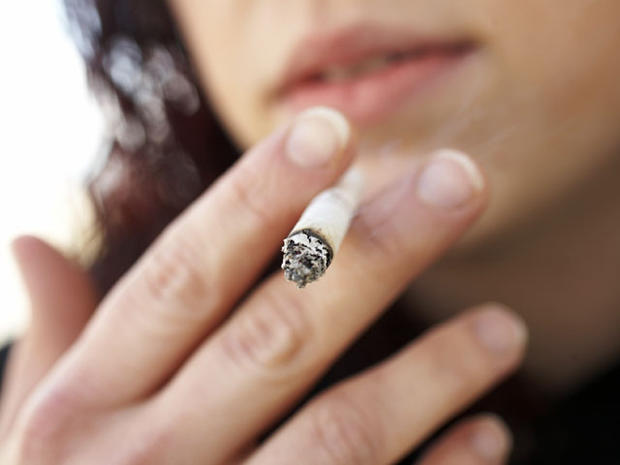Surgeon General's "shocking" teen smoking report sparks call for action
(CBS/AP) Far too many teens smoke cigarettes, according to a new report from the U.S. Surgeon General, and more measures like increasing cigarette taxes and creating smoking bands are needed.
PICTURES: Teen smoking: 12 states with highest rates PICTURES: Blowing smoke: Vintage ads of doctors endorsing tobaccoNearly one in five high school-aged teens smokes, a rate that's down from earlier decades but the rate of decline has slowed, the report showed.
"The numbers are really shocking," Surgeon General Regina Benjamin, told USA Today. "It's a problem we have to solve."
According to the report, it's particularly important to stop young people from using tobacco because those who start smoking as teens are more likely to be addicted as adults. They also quickly can develop health problems including reduced lung function and early heart disease.
More than 80 percent of smokers start by age 18 and 99 percent of adult smokers in the U.S. start by age 26, according to the 920-page report, which is the first comprehensive look at youth tobacco use from the surgeon general's office in almost two decades.
"In order to end this epidemic, we need to focus on where we can prevent it and where we can see the most effect, and that's with young people," Benjamin told The Associated Press. "We want to make our next generation tobacco-free, and I think we can."
The report details youth tobacco use, health impacts, and tobacco marketing and prevention efforts in the U.S., and officials hope the information will reinvigorate anti-tobacco efforts.
The report also recommended anti-smoking campaigns and increased restrictions under the FDA's authority to regulate tobacco as other ways to prevent adolescents and young adults from using tobacco products.
Benjamin did not point fingers on why youth tobacco use continues in the U.S. "I don't want to focus on blame, I want to focus on prevention," she said. "I want to make sure we're doing everything that we can to prevent kids from ever starting to smoke or use tobacco products."
Others did point the finger.
"Tobacco marketing is a big cause of the problem," Danny McGoldrick of the Campaign for Tobacco-Free Kids, told USA Today, citing his group's recent report on tobacco industry partnerships with convenience stores to prominently advertise products. He also cited the industry's resistance to increases on state tobacco taxes.
The Surgeon General's report also examined advertising and promotional activities by tobacco companies, which have been shown to "cause the onset and continuation of smoking adolescents and young adults."
Tobacco companies have spent increasing amounts of money on marketing efforts to reduce prices, which health officials said influences access to price-sensitive youth, making smoking more affordable.
Nearly $10 billion was spent in 2008 on cigarette marketing by the nation's five biggest tobacco companies, a 48 percent increase from what was spent in 1998, when some of the companies agreed with state attorneys general to curtail or stop some of their marketing efforts.
The new report is the 31st issued by U.S. surgeons general to warn the public about tobacco's risks. The first report in 1964 declared tobacco to be deadly.
Since the 1994 report, smoking among high school students has declined from 27.5 percent to 19.5 percent, or about 3 million students, but the rate of decline has stalled in recent years. About 5.2 percent, or 600,000 middle school students also are current smokers. According to the report, every day in the U.S., more than 3,800 people under the age of 18 smoke their first cigarette and more than 1,000 of them become daily smokers. They replace the 1,200 people who die each day in the U.S. from smoking.
The CDC says smoking can damage nearly every part of the body, causing stroke, blindness, heart disease, chronic lung problems, reduced fertility, and many types of cancer including lung, stomach, pancreatic, bladder, cervical, and colon cancers.
"We have come a long way since the days of smoking on airplanes and in college classrooms, but we have a long way to go," Secretary of Health and Human Resources Kathleen Sebelius said in a statement accompanying the latest report. "The prosperity and health of our nation depend on it."

